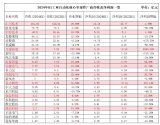View attachment 135594
I'd love for you guys to perform mental gymnastics on explaining how this is not bad. USD funds going away is fully expected, but RMB funds not investing = big big problem.
Bad or good is all relative and depends on context and priority.
In China's case, what are the overall geopolitical and overall economic goals that want to be attained, and how consequential, long lasting and important are these metrics in context of the performance of metrics in other domains? I'll elaborate on this below because your entire reply basically follows one theme.
We can talk all day long about how China looks in 2050 (mentally jerk off to the 2500 J-20s a fleet of 10 CGs at a GDP per capita of 35k USD equivalent) all we want but the long term is made up of many short terms - and the short term looks shit.
The long term is indeed made up of many short terms.
You are arguing that one domain of overall economic performance is doing poorly, which is not unreasonable on its surface.
However it is implied that you are worried about that domain of performance in context of at least medium and long term overall economic and geopolitical goals, and to substantiate those concerns it would be necessary to look at the other domains of economic performance (or argue why you believe your domain of interest is of disproportionately greater importance), as well as argue that there will be medium or long term consequences outside of the short term.
If your interest in this specific economic domain does not have medium or long term overall economic or overall geopolitical meanings or insinuations, then that is fine and just write so and everyone can recalibrate the meaning of what you're actually conveying.
Also, by 2050 one would expect that J-20s would be in the sunset phase of its life so presumably by then there shouldn't be too many remaining in context of the overall air fleet.
Before attacking the point, it helps to recognize that multiple things can be true at the same f'ing time.
No one is attacking your "point".
What people are wondering is why there is this one specific area of economic performance that you focus on in context of the overall economy, and why you seem to be insinuating that this specific domain of economic performance is of disproportionate concern in context of overall medium and long term Chinese economic and geopolitical goals.
On the other hand, if you are not saying or claiming that current performance in this specific economic domain is necessarily of consequence for the broader economy or geopolitical objectives in the medium and long term, then that's fine as well and I think everyone would thank you for that as it lets everyone properly frame your contributions.
As it stands, I think broadly speaking most people in this thread are aware that there are aspects of the economy which are performing less well than others, particularly those which are most exposed to industries that are being curtailed and deliberately reformed (property in particular), and that while there is recognition these efforts will cause negative sentiments, in the medium to long term the reforms and curtailment will be better for overall economic and geopolitical goals, and in the short term the overall economy and overall geopolitical goals can be met with the advancement of other industries and economic areas which also happen to be more conducive to long term geopolitical objectives.

